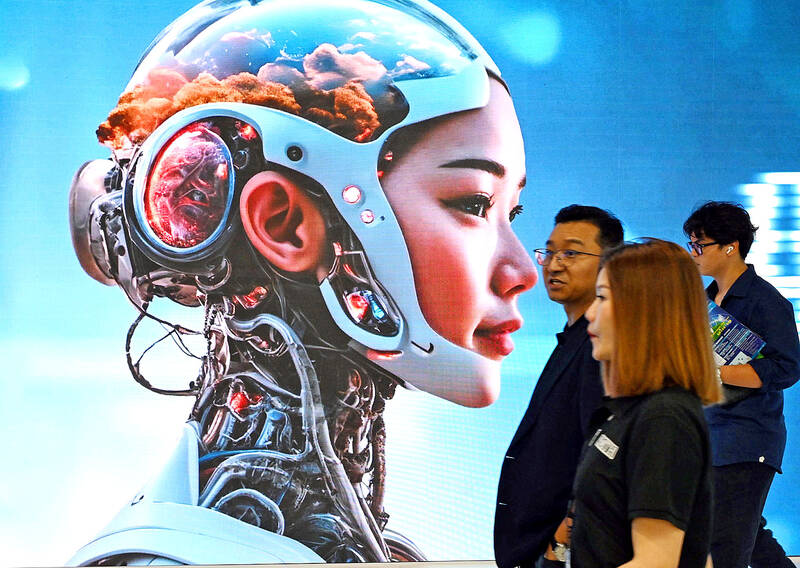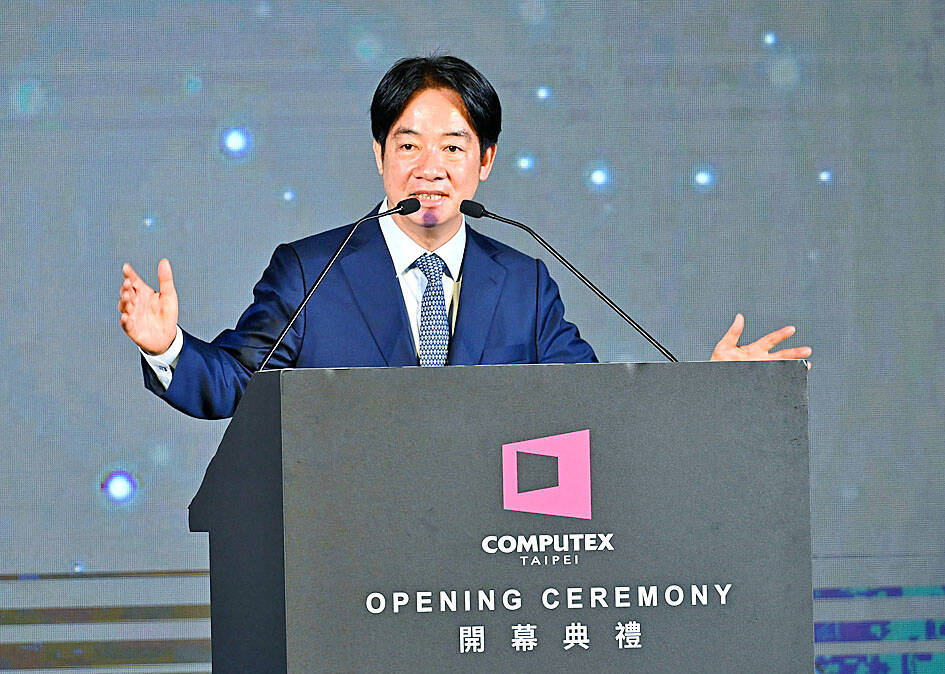President William Lai (賴清德) yesterday pledged to turn Taiwan into an “artificial intelligence (AI) island” through a reliable power supply and building supercomputers.
“The revolutionary development of AI would absolutely play a key role in the era of digitization. Taiwan is very blessed to have a technology industry in which leaders spent decades working and catapulting Taiwan into the center of the AI revolution, turning Taiwan from nobody to the world’s supporting pillars,” Lai said in a speech at the opening ceremony of Computex Taipei at the Taipei Nangang Exhibition Center.
Lai said there are three fundamental policies that the government would implement to transform Taiwan into an “AI island.”

Photo: Chang Chia-ming, Taipei Times
First, the government would ensure that there is a reliable supply of electricity and provide diverse forms of “green energy,” Lai said, adding that Taiwan would also build its own data centers.
“Second, the government would build supercomputers. We thank Nvidia Corp CEO Jensen Huang (黃仁勳) for donating a supercomputer to Taiwan, and we also thank Taiwan Semiconductor Manufacturing Co (台積電) for agreeing to pay the cost of operating it,” Lai said.
“The government would help build supercomputers if necessary, which would not only meet our demands, but also could be used by researchers in industry, government institutions and academia. This would ensure that AI can continue to develop in Taiwan,” he said.

Photo: Chang Chia-ming, Taipei Times
Third, the government would continue cultivating talent in information and communications technology, wafer and semiconductor manufacturing, and the AI industries so that the “AI island” goal can be achieved, he added.
Lai also urged industry leaders to support the government’s initiatives by investing in Taiwan.
This would help build an AI industry, which in turn would generate more innovation and applications, he said.
“We hope that more than 1 million small and medium-sized companies around the country would apply AI in running their businesses. This would ensure that the ‘AI island’ is not only a conceptual goal, but it would in reality give an economic boost to the nation and improve people’s lives,” Lai said.
Following his speech, Lai visited booths set up by Intel Corp, Micro-Star International Co (微星科技), Acer Inc (宏碁) and Asustek Computer Inc (華碩), and listened to presentations about AI-related services and products.

CHAOS: Iranians took to the streets playing celebratory music after reports of Khamenei’s death on Saturday, while mourners also gathered in Tehran yesterday Iranian Supreme Leader Ayatollah Ali Khamenei was killed in a major attack on Iran launched by Israel and the US, throwing the future of the Islamic republic into doubt and raising the risk of regional instability. Iranian state television and the state-run IRNA news agency announced the 86-year-old’s death early yesterday. US President Donald Trump said it gave Iranians their “greatest chance” to “take back” their country. The announcements came after a joint US and Israeli aerial bombardment that targeted Iranian military and governmental sites. Trump said the “heavy and pinpoint bombing” would continue through the week or as long

TRUST: The KMT said it respected the US’ timing and considerations, and hoped it would continue to honor its commitments to helping Taiwan bolster its defenses and deterrence US President Donald Trump is delaying a multibillion-dollar arms sale to Taiwan to ensure his visit to Beijing is successful, a New York Times report said. The weapons sales package has stalled in the US Department of State, the report said, citing US officials it did not identify. The White House has told agencies not to push forward ahead of Trump’s meeting with Chinese President Xi Jinping (習近平), it said. The two last month held a phone call to discuss trade and geopolitical flashpoints ahead of the summit. Xi raised the Taiwan issue and urged the US to handle arms sales to

A magnitude 5.6 earthquake struck off the coast of Yilan County at 12:37pm today, with clear shaking felt across much of northern Taiwan. There were no immediate reports of damage. The epicenter of the quake was 16.9km east-southeast of Yilan County Hall offshore at a depth of 66.8km, Central Weather Administration (CWA) data showed. The maximum intensity registered at a 4 in Yilan County’s Nanao Township (南澳) on Taiwan’s seven-tier scale. Other parts of Yilan, as well as certain areas of Hualien County, Taipei, New Taipei City, Taoyuan, Hsinchu County, Taichung and Miaoli County, recorded intensities of 3. Residents of Yilan County and Taipei received

Taiwan has secured another breakthrough in fruit exports, with jujubes, dragon fruit and lychees approved for shipment to the EU, the Ministry of Agriculture said yesterday. The Animal and Plant Health Inspection Agency on Thursday received formal notification of the approval from the EU, the ministry said, adding that the decision was expected to expand Taiwanese fruit producers’ access to high-end European markets. Taiwan exported 126 tonnes of lychees last year, valued at US$1.48 million, with Japan accounting for 102 tonnes. Other export destinations included New Zealand, Hong Kong, the US and Australia, ministry data showed. Jujube exports totaled 103 tonnes, valued at